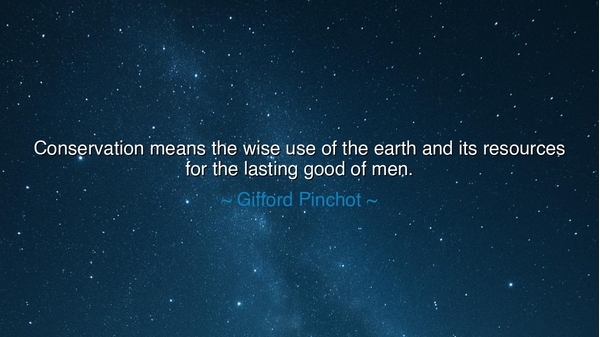
Conservation means the wise use of the earth and its resources
Conservation means the wise use of the earth and its resources for the lasting good of men.






Hear the words of Gifford Pinchot, forester, statesman, and guardian of the land, who proclaimed: “Conservation means the wise use of the earth and its resources for the lasting good of men.” These words are not the idle musings of a dreamer but the solemn creed of one who saw with his own eyes the forests falling, the rivers fouled, the soil stripped of life. He spoke not to condemn mankind, but to guide it—to teach that true dominion is not wasteful conquest, but wisdom, and that the treasures of the earth must be tended, not squandered, if they are to serve generations yet unborn.
The origin of this truth lies in the birth of America’s conservation movement. Pinchot, the first chief of the U.S. Forest Service, labored alongside President Theodore Roosevelt to preserve vast lands for the people. They saw the forests of the nation being devoured by industry, the mines dug without thought of tomorrow, the waters polluted without shame. Pinchot gave voice to a new vision: that the resources of the earth are not infinite, and that man must learn to use them with care, lest he leave behind deserts where once there were gardens.
The meaning of his words is both practical and profound. To use the earth unwisely is to consume today at the cost of tomorrow, to trade the wealth of a thousand generations for the fleeting comfort of one. But to use it wisely is to take only what can be renewed, to harvest without destroying, to balance need with reverence. In this way, the forests remain, the rivers flow, the soil endures, and all men may share in the abundance of creation, not just the privileged few of a single age.
History provides us with examples of both ruin and redemption. The Dust Bowl of the 1930s, when American plains were ravaged by drought and erosion, was the bitter fruit of neglecting Pinchot’s wisdom. Fields were stripped bare by relentless plowing, and when the winds came, they lifted the soil itself into the sky, leaving behind famine and despair. Yet from this calamity arose new practices—crop rotation, soil conservation, reforestation—that echoed Pinchot’s call to wise use. Out of suffering, men remembered the ancient truth: that the land is not a slave, but a partner.
The ancients, too, revered this balance. In Egypt, the Nile’s floods brought life, but only when its waters were honored and its cycles respected. When men forgot this, famine followed. Among the Hebrews, the land was commanded to rest every seventh year, for even the soil requires sabbath. Such practices echo Pinchot’s creed: that true conservation is not denial, but harmony, where use does not lead to ruin, and where the gifts of the earth remain gifts for all.
The lesson is clear: you are but stewards of the world, not its owners. The forest you cut must be replanted, the waters you drink must be kept pure, the soil you till must be guarded for those who come after you. To take without giving, to consume without care, is to steal not only from the earth, but from your children’s children. But to live in wisdom is to join the eternal chain of guardianship, passing on to the next age a world as full and fertile as the one you received.
Practical actions follow from this wisdom. Plant trees where forests have been cut. Protect waters from waste. Support the work of those who guard the wild places of the earth. In daily life, take only what you need, and honor the labor of the soil and sea that sustain you. Teach others that true greatness is not measured by how much one consumes, but by how much one preserves for the future.
Thus, let Pinchot’s words be remembered not only as policy, but as prophecy: “Conservation means the wise use of the earth and its resources for the lasting good of men.” Let every generation learn this truth, for the world is not ours to waste, but ours to tend. And those who live by this creed will find themselves not destroyers of creation, but keepers of an inheritance that endures forever.






AAdministratorAdministrator
Welcome, honored guests. Please leave a comment, we will respond soon